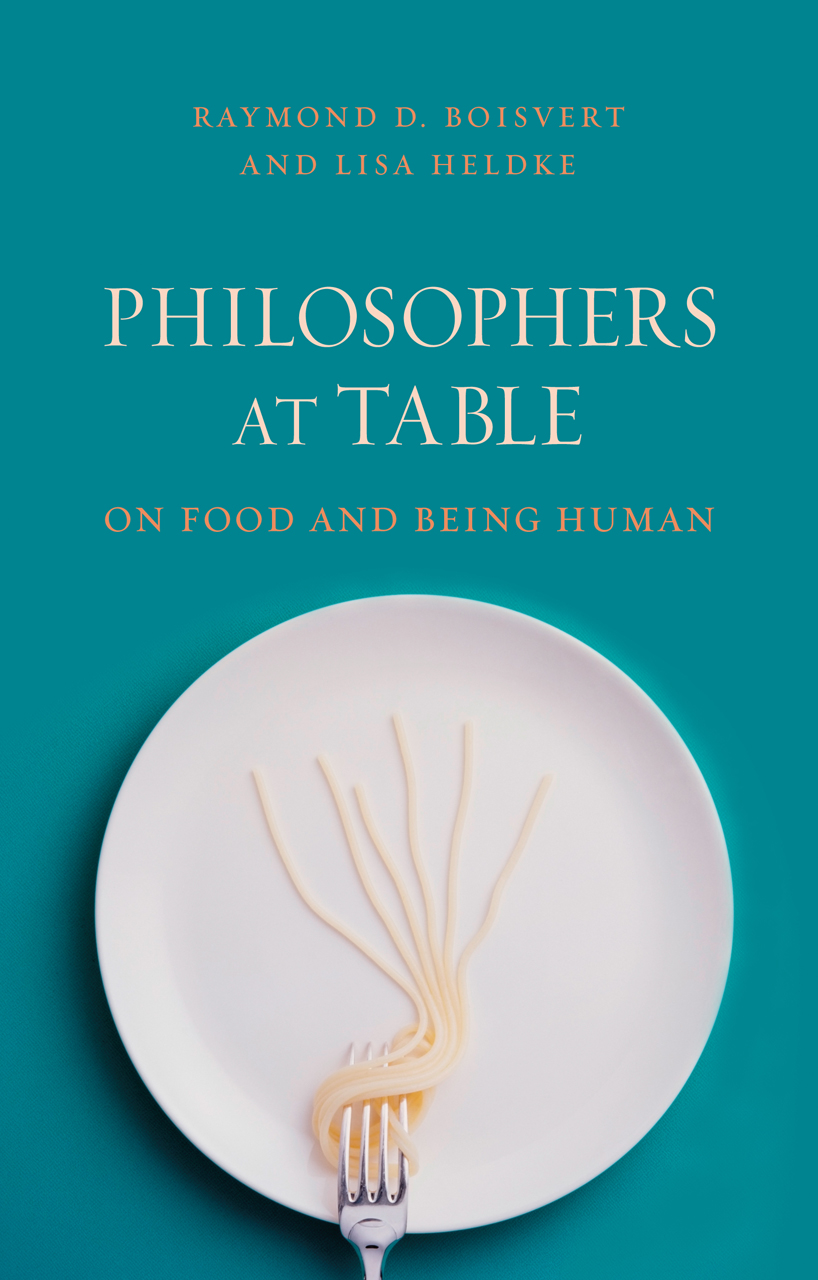 I’ll admit to skipping over the philosophy section when browsing bookstores. On the book buffet, philosophy sits there next to seitan or black-eyed peas – virtuous, yes, but surrounded by more enticing, tastier options. But Philosophers at Table, On Food and Being Human (Reaktion Books, London, UK, 2016) by two American professors of Philosophy, Raymond D. Boisvert of Siena College in the Capital Region of upstate New York and Lisa Heldke of Gustavus Adolphus College in St Peter, Minnesota is a welcome surprise.
I’ll admit to skipping over the philosophy section when browsing bookstores. On the book buffet, philosophy sits there next to seitan or black-eyed peas – virtuous, yes, but surrounded by more enticing, tastier options. But Philosophers at Table, On Food and Being Human (Reaktion Books, London, UK, 2016) by two American professors of Philosophy, Raymond D. Boisvert of Siena College in the Capital Region of upstate New York and Lisa Heldke of Gustavus Adolphus College in St Peter, Minnesota is a welcome surprise.
To continue the buffet metaphor, this book is kale salad with quinoa, sweet potatoes, and pepitas — bright and packed with ideas but readable and not densely written. The authors set out to challenge the common separation of soul and body, a central theme of modernity with roots in the Enlightenment. It’s a big project in a small book packed with sparkling prose and new ideas.
After explaining why food matters as a point of philosophical inquiry, the professors go on to explain why reading philosophy matters. They draw the unexpected comparison of philosophy to plumbing. Like plumbing, philosophy is a system of ideas that enable our world to work:
Philosophical plumbing shapes the ways we encounter and interrogate our world. It circumscribes what we count as valid and invalid questions, but often goes unnoticed…. It shapes the very questions we are able to ask and virtually guarantees the problems we will encounter.
In the authors’ view, the plumbing of categorical thinking is faulty and needs to be re-examined and repaired. Once food is placed in the center, as a legitimate object of inquiry, new insights flow freely.
We begin to see how either/or thinking has created false dichotomies that alienate us from our bodies, our communities, and the natural world:
Thinking about inquiry via tasting (emphasis added) shifts our attention from the (disembodied) mind or even the (utterly embodied) brain as the seat of all knowing. It invites us to experience our bodies as inquiring, investigating, analyzing entities.
In other words, we are not purely rational beings, viewing the world through a plate glass window. We are complex biological creatures who experience the world through all of our senses.
The book is structured like a seminar for smart undergraduates, with chapters on ethics, aesthetics, epistemology, and metaphysics. There is so much richness here. John Dewey, Kant, Hegel, Descartes, Rousseau, Aristotle, Derrida, and Homer, along with many others, are introduced and provide pathways to further study.
I was especially drawn to the chapter, Hospitality is Ethics, which begins simply enough with the dinner party conundrum:
Is it the responsibility of the host to accommodate eating preferences of guests or should the guest be willing to eat what’s served to them?
Moving on from that fundamental question, the meaning of guest and host is explored in terms of soil and farming, assimilation and diversity. Eventually we come to Derrida’s more complicated view of ethics:
Hospitality is ethics. Hospitality as a virtue urges us to combat complacency. It motivates us to seek connections and, yes, entanglements. The Homeric emphasis on gift exchange identifies one important move in mutual entanglement. Guests themselves are like gifts. They bring something new and valuable by their very presence. So too do they bring complications, perhaps discomfort, and certainly the need for patience….Both guest and host become indebted to each other.
We live in complicated times and this book provides useful and hopeful context for finding a new path forward. By accepting nourishment as a central aspect of our humanity, we see the value of both the farmer and the communal table in breaking down barriers between people and in allowing us to understand ourselves in a more integrated way.
By exposing the creaking plumbing of categorical thinking that undergirds many of our simplistic either/or notions, Boisvert and Heldke help us realize that self-sufficiency is insufficient when it comes to rebuilding community, reintegrating agriculture into culture, and our species into nature. A philosophy that starts with food may just be the way to break down the real and perceived barriers that we have erected between our mind and body, between ideas and between each other, with the overlapping and interconnection of people and ideas demonstrated.
Philosophers at table do not stand apart from the world in the words of Boisvert and Heldke, instead, they are engaged participants whose interactions are naturally thankful and thoughtful. And the ultimate question the professors ask, “How are we needy beings to eat?” leads to an answer, much in harmony with the rich analysis of Wendell Berry’s critique of industrial agriculture: hospitably, with the full knowledge that our lives quite literally rest upon the lives of myriad others. Hunger, and the need to satisfy it, encourage thoughtful planning, careful husbandry and concern for consequences.
(Laura Shore, 12/22/17)





